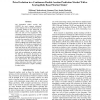Free Online Productivity Tools
i2Speak
i2Symbol
i2OCR
iTex2Img
iWeb2Print
iWeb2Shot
i2Type
iPdf2Split
iPdf2Merge
i2Bopomofo
i2Arabic
i2Style
i2Image
i2PDF
iLatex2Rtf
Sci2ools
AAAI
2015
2015
Price Evolution in a Continuous Double Auction Prediction Market With a Scoring-Rule Based Market Maker
The logarithmic market scoring rule (LMSR), the most common automated market making rule for prediction markets, is typically studied in the framework of dealer markets, where the market maker takes one side of every transaction. The continuous double auction (CDA) is a much more widely used microstructure for general financial markets in practice. In this paper, we study the properties of CDA prediction markets with zero-intelligence traders in which an LMSR-style market maker participates actively. We extend an existing idea of Robin Hanson for integrating LMSR with limit order books in order to provide a new, self-contained market making algorithm that does not need “special” access to the order book and can participate as another trader. We find that, as expected, the presence of the market maker leads to generally lower bid-ask spreads and higher trader surplus (or price improvement), but, surprisingly, does not necessarily improve price discovery and market efficiency; th...
| Added | 27 Mar 2016 |
| Updated | 27 Mar 2016 |
| Type | Journal |
| Year | 2015 |
| Where | AAAI |
| Authors | Mithun Chakraborty, Sanmay Das, Justin Peabody |
Comments (0)

